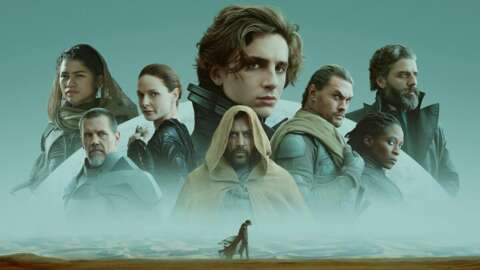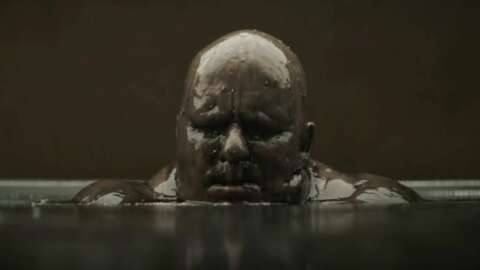Dune's Paul Atreides Isn't Luke Skywalker, Despite What The New Movie May Have You Believe
Paul isn't a hero on a journey, he's a prisoner to politics and prescience.
A young man, stuck on a desert planet, learning about the special mind powers inherent to his genetic lineage, preparing to take on the emperor himself. That description could easily fit Luke Skywalker from the Star Wars franchise or Dune's Paul Atreides. But beyond that high-level summary of the character, the two stories couldn't be more different. And yet, Paul is often treated the same way.
There's no right age to discover a book, but it seems like Dune tends to hit around the age of 13 or 14 for many readers. It's when I read the story and when director Denis Villeneuve read it; everyone I asked around me was no more than a year or two out from that. But in the years since, my relationship with Dune, protagonist Paul Atreides, and the universe of the Imperium have all changed, and so has my relationship with this story.
When I first read Dune, Paul was essentially Luke Skywalker. As the description above suggests, the two seem superficially pretty similar. Just swap out laser swords for sandworms.
It's easy to latch onto young Paul. As Dune begins, he's roughly the age I and so many others were when we first read the story. We meet him at the beginning of an incredible adventure where he finds out that not only does he have special powers, people have been waiting millennia for him to arrive. He sees a pretty girl in his dreams, and then he meets her. He gets a special sword and has a legion of Fedaykin--death commandos--protecting him and doing his bidding. He pilots a monster hundreds of feet long with no more than a couple of hooks.
I remember as a teenager that I would almost worship the sayings used in the Dune novel and in Lynch's movie, like the Fear Litany (I must not fear, fear is the mind-killer...) and the Mentat Mantra (It is by will alone I set my mind in motion). The whole story felt like a power fantasy at that age; what if I had the mind of a mentat, the combat prowess of a Sardaukar? What if I could command people with my voice just by changing the pitch?
All of it felt so exciting. As I got older, I would re-read the book a handful of times, and in that time it was less a power fantasy and more a sci-fi epic. I wasn't seeing it through Paul's eyes, but I wasn't yet seeing it with the clarity that age can bring.
Paul looks at first blush like a classic white savior-style character. He's a white guy from a place of oceans and greenery, often coded as coastal Scotland in imagery. He goes to a desert planet, a totally foreign place, where people speak of him in whispers. In the first of Villeneuve's Dune movies, we see prophetic images of him in Fremen armor fighting like a demon, and in the film's final moments he--a fourteen-year-old boy who has never killed a man--defeats the veteran warrior Jamis in one-on-one combat. We know he's going to lead the Fremen to victory.
But Dune isn't a story about a powerful teenage boy who would eventually become emperor thanks to his cool powers and friends, it's a story about a kid who never had any choice about the life laid out for him. All of this went completely unnoticed when I first read the novel. The somewhat ham-fisted metaphor of Melange as a stand-in for oil, the truth of Paul's anger at the predetermination that controls his life.
Paul Atreides was trained from a very early age as a warrior, a strategist, and a monk. His mother, Jessica, had full knowledge of his genetic lineage and of the Bene Gesserit plan to create the Kwisatz Haderach--a male Bene Gesserit in an otherwise exclusively-female religious organization of spy-nuns. While she tells herself and her family that she had a son for Leto instead of a daughter, she also knew the potential "greatness" she was having thrust upon him.
The Bene Gesserit plot is just one of what Baron Harkonnen calls in the book "plans within plans within plans." Their plot hid inside the plot of the Harkonnens and Emperor to solidify control of the spice trade to ensure the safety of the empire itself, which is wrapped up in the Guild Navigators that enable interstellar travel. It's not always easy to tell who is controlling who in Dune, but Paul is at the mercy of his mother, who is forwarding the Bene Gesserit's plans whether she intends to or not. They control the Imperium, who control the Harkonnens, who control the Atreides through subterfuge, including Dr. Yueh's betrayal.
Paul arrived on Arrakis to those whispers because the Bene Gesserit spent generations seeding the villages and cities on the planet with those legends. Years of training and millennia of genetic manipulation take hold as Paul stops the Hunter Seeker in his bedroom, as he dons his Stillsuit and adjusts the boots in "slip fashion," and then when he finds himself enveloped in a cloud of Melange before the doomed spice harvester, throwing his prophetic visions into overdrive.
With each step toward his predestiny, Paul comes closer to escaping one trap and entering another. He's free of the Imperium, but he becomes a slave to the future. Not unlike Dr. Manhattan describes in HBO's Watchmen, Paul is living simultaneously in the future and the present. As visions come true around him, he also begins to help them come true.
Dune is a story about Western powers fighting over a resource buried in the desert, interfering with the lives of the natives of that region to their own ends. You don't notice it when you're a teenager reading about the most important boy in the known universe.
I loved much of Villeneuve's take on Frank Herbert's novel, but by Villeneuve's own admission he decided to tell the story through Paul's own eyes. Some of the political machinations described above will theoretically unravel in the second Dune film, but watching Dune now--seeing Paul's story very differently from how I saw it as a teenager--it's hard not to feel like something is left missing. Denis Villeneuve's Dune feels more like the story I read as a teenager, and not like the one I can so clearly see as an adult.
Got a news tip or want to contact us directly? Email news@gamespot.com







Join the conversation